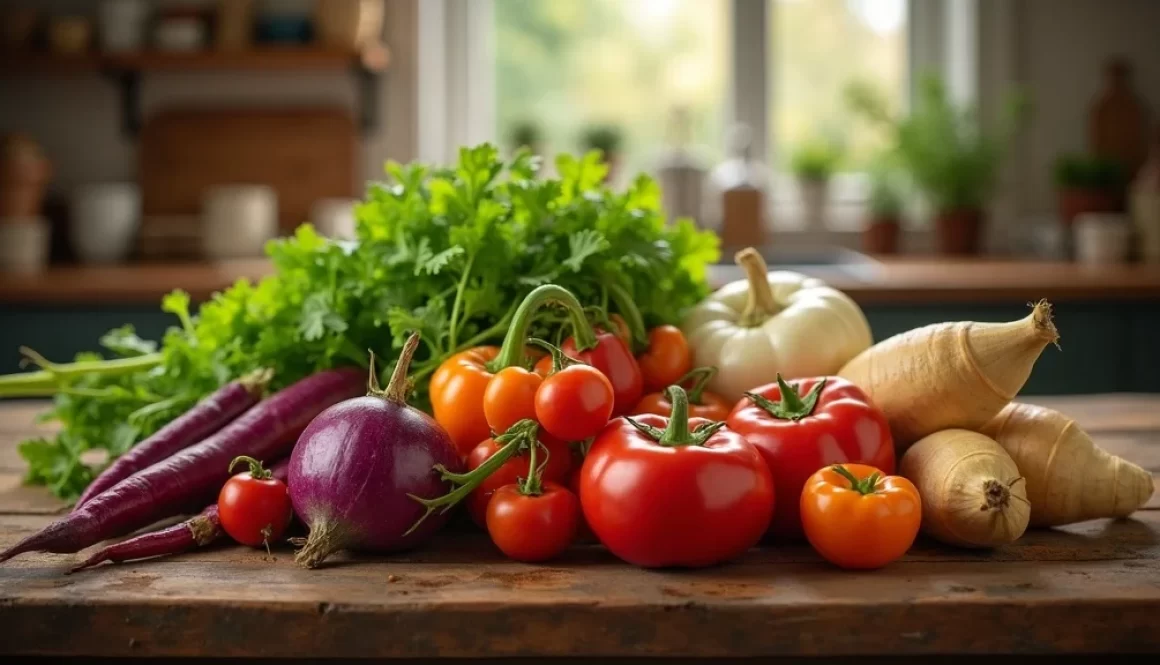Stay Strong This Winter: Why Protein and Minerals Matter Most
Startling Statistic: Did you know that people who prioritize protein and mineral-rich foods in winter take 40% fewer sick days than those who don’t? Fueling your body with the best foods for winter health is more than a trend—it’s your frontline defense for resilience, energy, and immune strength all season long. In this article, you’ll discover why protein and minerals matter most, which winter foods pack the biggest punch, and how to make these nutritious choices a delicious staple in your daily life.
What You’ll Learn About the Best Foods for Winter Health
-
The nutritional science behind winter eating habits
-
How proteins and minerals support your immune system and energy
-
The top 20 best foods for winter health, with a focus on root vegetables, Greek yogurt, healthy fats, and leafy greens
-
Practical ways to integrate these foods into your daily routine
-
How to leverage traditional tips—from lemon water to sea minerals—to enhance wellness
Startling Stat: Why Best Foods for Winter Health Are Critical
Did you know? Studies show people consuming more protein and key minerals in winter have 40% fewer sick days.
The colder months can weaken your immune system, increasing your risk of illness and leaving you feeling tired and sluggish. Focusing on the best foods for winter health—like root vegetables, Greek yogurt, and healthy fats—provides the essential proteins, vitamins, and minerals your body craves to maintain energy and robust immune defenses. By making smart food choices, you not only reduce your chances of winter colds but also boost your vitality for everything the season brings.
List: 20 Best Foods for Winter Health and Why They Matter
-
Root Vegetables—Sweet Potatoes, Carrots, Turnips: Packed with immune-boosting vitamins and minerals, root vegetables like sweet potato are high in fiber and antioxidants, making them a great source of energy during the winter months. Rich in vitamin C and complex carbohydrates, they help stabilize blood sugar and keep you full.
-
Greek Yogurt: Known for its high protein content and probiotics, Greek yogurt supports gut health and is a good source of calcium and vitamin B12. Enjoy it as a snack or breakfast to promote digestive wellness and immune function.
-
Leafy Greens—Kale, Swiss Chard, Collard Greens, Spinach (Minimally): Full of minerals like magnesium and packed with vitamin C, leafy greens strengthen your immune system and provide antioxidants critical for cellular repair. Add fresh greens to soups, salads, or smoothies for optimal winter health benefits.
-
Citrus Fruits—Oranges, Lemons: Essential for fighting seasonal colds, citrus fruits provide a concentrated source of vitamin C, helping your body fend off infections, boost collagen production, and accelerate recovery.
-
Oily Fish—Salmon, Sardines: These fish are a top source of healthy fats like omega-3s and vitamin D—nutrients often lacking in winter. Their anti-inflammatory benefits support heart health and immune resilience.
-
Lamb or Beef Stew: A warm, hearty stew provides lean meat for protein, root vegetables for minerals, and a comforting meal capable of nourishing the body and soul during cold months.
-
Sea Vegetables (from West Coast): Unique for their iodine and trace mineral content, West Coast sea vegetables like kelp and dulse boost thyroid health and provide over 70 minerals.
-
Avocado: Loaded with healthy fats and vitamin E, avocado gives you lasting energy and helps enhance the absorption of fat-soluble vitamins from other foods.
-
Quinoa: As a plant-based protein, quinoa is high in fiber and provides all nine essential amino acids, offering lasting fullness and steady energy.
-
Eggs: A convenient, high-quality protein source, eggs offer choline and vitamins vital for brain health and cellular repair.
-
Pressure Cooked Beans/Lentils: Cooking beans and lentils in a pressure cooker enhances mineral absorption and protein availability while making them easy to digest. Best soaked & sprouted before cooking – takes off the enzyme inhibitor, allowing for a protein source primarily vs. carbs.
-
Nuts and Seeds—Almonds, Sunflower: Dense in healthy fats, zinc, and vitamin E, nuts and seeds are perfect for supporting immune function and providing nutrient-rich snacks. Avoid peanuts.
-
Whole Oats and Buckwheat Groats: Complex carbs in oats and groats offer stable winter energy and are high in fiber, which supports gut health and heart health.
-
Extra Virgin Olive Oil: A staple of the Mediterranean diet, extra virgin olive oil is key for absorbing fat-soluble vitamins. Its healthy fats are essential for cellular health and immune response.
-
Fermented Foods—Pathways Cultured Vegetables, Kimchi, Sauerkraut: These probiotic-rich foods support gut immunity and digestion, promoting a diverse and resilient microbiome.
-
Braggs Apple Cider Vinegar: Just a tablespoon each morning helps wake up your system and improve digestion with its acetic acid and probiotic content. One tablespoon in 3 to 4 ounces of pure water immediatley before all meals will enhance digestigion with small amounts of probiotic support.
-
Bone Broth: Loaded with minerals and collagen, bone broth nurtures joint health, aids immunity, and has been a winter staple for generations. Loaded minerals also supports cellular cleansing.
-
Winter Squash: This hearty vegetable is rich in beta carotene, fiber, and is perfect for satisfying winter meals.
-
Celtic Sea Salt (from the sea) and Original Pink Himalayan (from the rock): Unlike regular table salt, sea and rock salts provide over 70 trace minerals, supporting body repair and hydration.
-
Dark Chocolate (70%+): Antioxidant-rich dark chocolate supports mood and heart health, making it a guilt-free winter treat.
The Science Behind Proteins and Minerals in the Best Foods for Winter Health
Proteins and Amino Acids are the foundation of every cell in your body, especially crucial during the winter months when your immune system is under additional stress. Consuming high-quality protein from sources like Greek yogurt, nuts, seeds, lean meat, eggs, and pressure-cooked beans gives your immune function a direct boost. These rich foods provide amino acids necessary for repair and the production of antibodies that fight infection. Similarly, minerals such as magnesium and zinc—the kind found in leafy greens and sea vegetables—help regulate cellular health and fortify your immune defenses.
Studies indicate that a synergy exists when you combine protein-rich foods with mineral-dense choices. For example, topping leafy green salads with Greek yogurt or adding sea vegetables to hearty winter soups amplifies their health benefits. Magnesium calms inflammation, zinc supports white blood cell production, and both are vital for energy regulation during the cold, often low-sunlight, winter months. Focusing on these nutrient-dense foods supports not just day-to-day wellness but also long-term vitality.

Morning Rituals: Lemon Water, Apple Cider Vinegar & the Best Foods for Winter Health
-
How half a lemon in warm water jump-starts your system
-
The role of apple cider vinegar in daily repair and gut health
“A mug of warm lemon water with sea salt each morning can awaken your metabolism and support immune defenses.” – Nutritionist’s Tip
Kickstarting each day with lemon water and a dash of sea salt gently hydrates cells, boosts digestion, and helps your body absorb trace minerals that are critical for winter repair. Lemon activates hepatic function, while the 70+ minerals in unprocessed sea salt help restore electrolyte balance after a night’s rest. Add a splash of Braggs apple cider vinegar for probiotics and acetic acid, both of which aid gut health and bolster immune system function. These simple rituals, embraced daily, play a profound role in preparing your body to face the winter months with energy and resilience.
Rich Foods for Immune System Support: What to Add to Your Winter Diet
|
Food |
Key Nutrients |
Suggested Serving Ideas |
|---|---|---|
|
Greek Yogurt |
Protein, Probiotics, Calcium |
Parfait with nuts and seeds |
|
Root Vegetables |
Fiber, Vitamin C, Beta Carotene |
Roast with olive oil and herbs |
|
Leafy Greens |
Magnesium, Vitamin K, Iron |
Sautéed with garlic or added to soups |
|
Braggs Apple Cider Vinegar |
Probiotics, Acetic Acid |
Add to warm water or salad dressings |
|
Extra Virgin Olive Oil |
Healthy Fats, Vitamin E |
Drizzle on salads and roasted veggies. 3 Tablespoons = one shot glass immediately before bed for liver and gallbladder detox. |
|
Winter Squash |
Beta Carotene, Fiber |
Bake with cinnamon and nutmeg |
|
Sea Vegetables |
Iodine, Trace Minerals |
Simmer into broths or soups |
-
Braggs Apple Cider Vinegar, olive oil, and winter root vegetables provide a cascade of immunity-boosting nutrients.
-
Greek yogurt and leafy greens enhance gut and cellular health, supporting resilience against cold-weather bugs.
Boosting Minerals: Celtic Sea Salt, Sea Vegetables & Hot Baths
-
Why Celtic (sea) and Himalayan (rock) provide a mineral edge: Unlike refined salt, these varieties retain up to 70 trace minerals necessary for nerve, muscle, and immune function, especially vital in dry, cold conditions.
-
West Coast vs. East Coast sea vegetables: West Coast sea vegetables (such as kelp and dulse) absorb a greater variety of minerals from nutrient-rich Pacific waters, providing a superior mineral profile for winter nutrition.
-
Hot bath rituals: Taking an Epsom or sea salt bath nightly not only relieves tired muscles but also allows systemic absorption of magnesium and other minerals. Adding healing essential oils elevates this from a relaxing experience to a genuine immune-support ritual for the winter months.

Best Ways to Incorporate Best Foods for Winter Health into Your Day
-
Easy recipes with root vegetables, healthy fats, and proteins: Try roasted sweet potatoes and carrots drizzled with extra virgin olive oil or a warming lamb stew paired with winter squash and West Coast sea vegetables. These meals are nourishing and easy to prepare in big batches using a slow cooker or pressure cooker, perfect for busy winter nights.
-
Quick snacks: Enjoy Greek yogurt parfaits with sunflower seeds and citrus, or blend leafy greens with avocado and citrus fruits into a smoothie loaded with minerals and vitamins. These convenient options ensure you’re getting a steady intake of immune-supporting nutrients throughout the day.
-
Winter meal prep tips: Batch-cook beans and lentils in a pressure cooker for enhanced mineral absorption, and store roasted root vegetables and quinoa in meal prep containers for ready-to-eat, energy-boosting lunches. Integrate fermented foods and healthy fats in each meal for gut health and sustained winter energy.

Quote: Nutritionist’s Insight on Best Foods for Winter Health
“Incorporating a variety of root vegetables, leafy greens, healthy fats, and quality proteins can transform winter wellness and support immune strength all season long.”
Key Takeaways: Simple Strategies for Best Foods for Winter Health
-
Prioritize proteins and diverse minerals every day to keep your immune system robust and muscles strong.
-
Integrate root vegetables and healthy fats with every meal for sustained winter energy and cellular health.
-
Don’t forget to include fermented and probiotic-rich foods like Greek yogurt and fermented vegetables (Pathways fermented vegetables are best) to support gut and immune wellness.
-
Make hot, mineral-rich baths part of your nightly routine for relaxing systemic mineral absorption and quicker winter recovery.
FAQs: Best Foods for Winter Health
-
Is it important to eat different foods in winter?
Yes—winter creates unique demands on your immune system and energy levels. Emphasizing the best foods for winter health, such as root vegetables, Greek yogurt, healthy fats, and leafy greens, ensures you get more vitamins, minerals, and antioxidants tailored to these seasonal needs. -
Which minerals are most vital for the immune system during winter?
Magnesium, zinc, and iodine (found in leafy greens, sea vegetables, and unprocessed sea salts) are essential for immune function and cellular repair during cold, dry months. -
Can diet really help prevent getting sick in colder months?
Absolutely. Consuming a variety of protein-rich, mineral-dense foods, plus vitamin-C-laden citrus and probiotic-rich fermented foods, all boost your immune system’s resistance to winter illnesses. -
Are there vegetarian options for the best foods for winter health?
Yes—plant-based eaters can rely on Greek yogurt, quinoa, pressure-cooked beans, nuts, seeds, root vegetables, leafy greens, and fermented foods for complete nutrition and immune support. -
What should I avoid eating to stay healthy this winter?
Limit processed foods high in saturated fat, added sugars, or low sodium content. Instead, favor whole, nutrient-dense options for better health benefits. -
Granny Smith Apples, high in pectin, and Oranges, high in Vitamin C, are superior fruit choices.
People Also Ask: Best Foods for Winter Health
What to eat in winter for good health?
A nutrient-rich winter diet should emphasize the best foods for winter health including root vegetables, Greek yogurt, healthy fats, citrus fruits, and leafy greens. These foods support immune function, provide steady energy, and help maintain overall wellness, ensuring you thrive even during the coldest months. Their balance of vitamins, minerals, and healthy fats is ideal for defending against winter bugs and staying active and resilient.

What is the best food to eat in the winter?
Root vegetables and healthy fats stand out as the best foods for winter health. Sweet potatoes, turnips, and carrots are packed with immune-boosting vitamins, while avocados and olive oil are loaded with healthy fats necessary for energy and nutrient absorption. Together, they provide a balanced supply of nutrients and help protect your body from seasonal illnesses.
What is the healthiest thing to eat when you have a cold?
Liquid meals are better – for 24 hours are effective in fighting a cold. Bone broth, rich in minerals). These options provide protein for repair, probiotics for gut health, vitamins for immune resilience, and hydration—elements essential for faster recovery from colds and supporting overall immune system strength.
What foods boost your immune system in the winter?
Rich foods, such as root vegetables, sea vegetables, leafy greens, citrus fruits, and healthy fats, all contribute to fortifying your immune system during the winter. Integrating these foods into your daily diet enhances your body’s ability to fend off infections and maintain energy throughout the season.

Summary: Stay Strong With the Best Foods for Winter Health
Focusing on the best foods for winter health—especially proteins, minerals, and immune-boosting produce—can help you stay strong, energized, and resilient all winter long.
Ready to Revitalize Your Winter Wellness?
Call us at (610) 966-7001 to learn more about tailored nutrition plans or winter wellness support.

